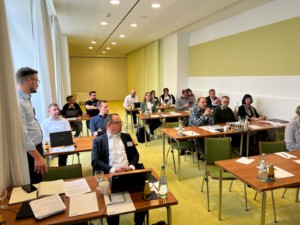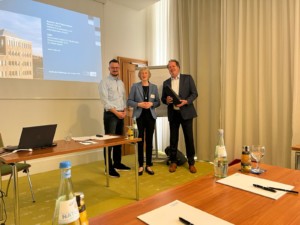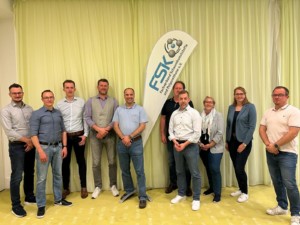Stuttgart, 16.04.2024 – Lectures, group work and plenary discussions at the “Insulation Materials Specialist Day – Sustainable into the Future” on 9 and 10 April 2024 shed light on forward-looking topics in the construction industry. The Insulation Materials Specialists Group of the Foamed Plastics and Polyurethanes Association (FSK) had invited participants to the symposium in Berlin and put together a great program.
“Great presentations and contributions from the group – we took a lot away with us!” said FSK Managing Director Klaus Junginger in a brief summary of the event. The event was deliberately kept relatively small and was therefore fully booked. This allowed the speakers and participants to delve deeper into the topic. The symposium started with a rousing introduction by Peter Bachmann from the Sentinel Haus Institut GmbH in Freiburg. He vividly presented the Sentinel Haus concept, which could help to develop the solutions that will be needed in the future.
Jurist Kerstin Abend from the DIBt (German Institute for Building Technology), and therefore directly from Berlin, had prepared the European Construction Products Regulation for the participants. The CPR is expected to be adopted by the European Parliament before the European elections in June 2024. It is then expected to come into force at the end of 2024/beginning of 2025. The presentation was met with great interest as it dealt in particular with the upcoming new regulations and the resulting consequences. Anita Kietzmann from IBU (Institut Bauen und Umwelt e.V.) was also sent from Berlin to give a presentation. Her presentation introduced the IBU and its globally recognized EPDs. EPDs will be almost indispensable in the future, as they form an important basis for the sustainability assessment of buildings. The use of independent third-party experts and continuous monitoring and review by an independent expert council are a matter of course. In his comprehensive presentation, Prof. Alexander Rudolphi introduced the assessment system of the DGNB (German Sustainable Building Council), which is also based in Berlin. He also presented the requirements matrix for building products and focused in particular on the insulation materials and products associated with them. Dr. Sebastian Harms, Chemische Fabrik Budenheim KG, had prepared a market analysis for flame retardants in insulating materials and brought this with him as a presentation. He openly outlined the company’s own efforts against the background of substance regulations and reported on the challenges on the way to sustainable, halogen-free flame retardants.
“The size and setting of the event was just right for an intensive working meeting,” Junginger continued. The day before the symposium, the insulation materials specialist group had already held its 78th meeting within the association and discussed forward-looking topics and legislative trends in a smaller group. The agenda included topics such as the equivalence of concentric insulation, GEG amendments, standardization, news from the association’s European and national partner associations and networks, as well as marketing and social media and the use and benefits of AI.
Participants at the Insulation Symposium listened intently to the presentations and technical discussions in the plenary session
FSK Managing Director Klaus Junginger (right) and the specialist group spokesperson Bernhard Radinger, Steinbacher Dämmstoffe GmbH (left) thanked all the speakers: pictured Kerstin Abend, DIBt (German Institute for Building Technology)
Insulation specialist group with spokespersons Bernhard Radinger, Steinbacher Dämmstoff GmbH (left) and Daniel Graba, BBQS GmbH (right) and FSK Managing Director Klaus Junginger (6th from right)
Further information on the Fachverband Schaumkunststoffe und Polyurethane e.V. (FSK) and its events, as well as on the work of the expert committees, is available online at www.fsk-vsv.de/eng or by phone: 0711 993 751- 0.



